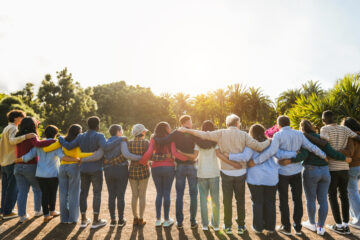After 7 months of fellowship, you may think that things would settle down at work, and tasks would get more operational, but that is not the case at IBM where every day brings a brand-new experience. My supervisors at IBM Corporate Service Corps team do not only build a solid fellowship experience for me, but they also enrich it with diverse, focused and specialized projects based on my expertise, interests and potential. Last week, Gina Tesla, IBM VP for Corporate Citizenship engaged me in one of the events she is part of at MIT, she was a judge of the MIT IDEAS Global Challenge. IDEAS is an annual innovation and social entrepreneurship competition for MIT students and their collaborators, run by the Priscilla King Gray Public Service Center, in which they enable students to apply their MIT education in real-world situations to tackle quality of life issues for people around the world, winning teams receive up to $15,000 to launch their projects during a 15-month grant period. Over its 17 years, IDEAS, organized annually by the Priscilla King Gray (PKG) Public Service Center, has awarded more than $1 million to 160 teams that now impact more than 2.5 million people in 44 countries. Winners have gone on to secure more than $42 million in additional funding.
Students and communities alike benefit from the IDEAS program. Students gain skills in proposal writing, teamwork, prototype development, communication, fieldwork, entrepreneurship, and innovation. Teams often leverage their award to attract additional investments and build social enterprises that make lasting contributions to human well-being in the communities being served.
Ten student teams with inventions to improve people’s lives worldwide — from portable ventilators for resource-strapped hospitals, to wheelchair cushions that prevent sores, to multipurpose sleeping bags for refugees — on Saturday split awards totaling $92,500 at the annual MIT IDEAS Global Challenge showcase and awards ceremony.
Grand prize winner of $15,000 went to Umbulizer, a team developing a low-cost, portable ventilator — made by modifying and simplifying the machinery — for patients in rural areas where medical resources are scarce and unreliable.
An additional nine winners, chosen by a team of judges that include seasoned entrepreneurs and venture capitalists, received four $10,000 awards and five $7,500 awards.
Throughout Saturday afternoon, 40 teams showcased innovations in the Samberg Conference Center in nine categories: water and sanitation, education and training, agriculture and food, health and medical, emergency and disaster relief, infrastructure, energy and environment, mobile devices and communication, and finance and entrepreneurship.
A team of three MIT mechanical engineers, Loop, took home a $7,500 prize for tackling an issue that is little known and affects people who use wheelchairs in developing countries: preventable pressure sores.
The eight other winners were:
- TravlerPack ($10,000), developing a water-resistant sleeping bag for refugees that withstands extremely cold temperatures, comes equipped with mosquito nets, and can be zipped together with other bags to fit entire families;
- OZÉ ($10,000), developing a mobile app that empowers small business owners in Africa to make data-driven decisions;
- DIL ($10,000), developing a mobile app that generates dictionaries and offers a convenient way to record and store proverbs, songs, and stories;
- STEMgem ($10,000), developing tech toolkits that allow learners, especially young girls, to build internet of things and wearable technologies for sports and social interactions;
- Aeolian ($7,500), developing an air-quality monitoring network for indoor spaces;
- Libremente ($7,500), developing a text message-based program to improve mental health of disaster victims;
- PreserveAir ($7,500), developing climate field storage and transport services for farmers to minimize dehydration losses; and
- Capiche ($7,500), developing an education discussion platform that uses artificial intelligence to evaluate student learning.
This year, more than 500 interested students attended dinners and other events, many sponsored the Bose Corporation, where they learned from past IDEAS winners and entrepreneurial mentors, pitched ideas, and recruited team members. IDEAS also awarded 25 teams funding throughout the year to help them build prototypes.
Past IDEAS winners were on hand at the ceremony to present awards to and provide brief remarks about their startups’ progress and the long-lasting impact of IDEAS. One, keynote speaker Sean Grundy, co-founder of Bevi, won a $7,500 prize at the 2013 IDEAS competition for developing smart flavored-beverage refill machines that aim to help eliminate plastic bottles. With machines now in more than 2,000 offices nationwide, the startup saves more than 2 million plastic bottles per month, Grundy said.
Grundy attributed some of Bevi’s success to participating in IDEAS, which provided his team early motivation and support. “You guys are dealing with the most inspirational and most useful people to get involved with on campus,” he told the teams in the audience. “Especially during the early stages, someone to help you stay motivated is so important.”
I did talk to innovators and was touched with their enthusiasm to make a change, but what made my day in addition to the breath-taking view of the Samberg Conference Center, was that I could tell who the winners would be in a global challenge at MIT with my expertise in evaluating projects in the Palestinian innovation ecosystem.





